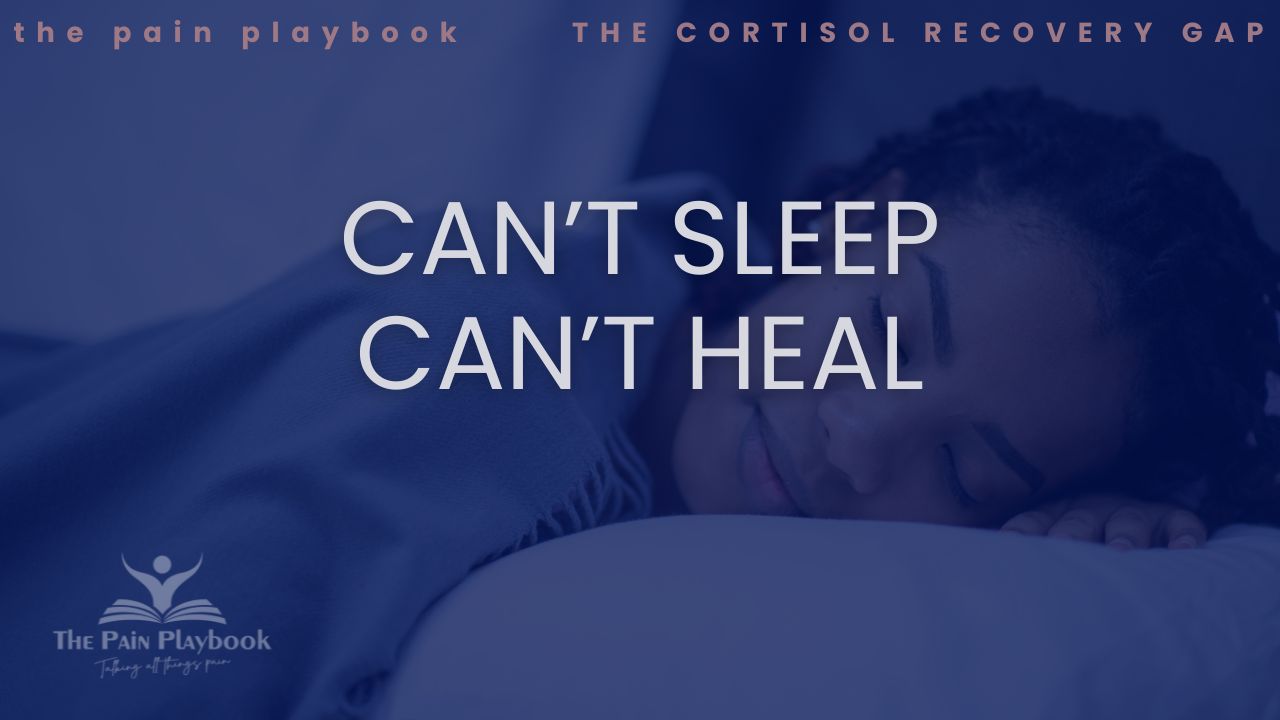
Can't Sleep, Can't Heal
Can’t Sleep, Can’t Heal: The Stress-Sleep-Pain Loop
You can foam roll, hydrate, eat your protein, even take supplements — but if you’re not sleeping, your body is stuck in a low-grade survival state.
Recovery can’t happen when the nervous system doesn’t feel safe.
And we’re not just talking about the amount of sleep. It’s the quality. Deep, uninterrupted, restorative sleep is when tissue repair, hormone regulation, and memory processing all happen. It’s also when your brain handles pain differently — sleep literally changes pain processing.
At BodyTech, we’ve seen how poor sleep shows up in recovery:
Clients with jaw/neck pain who clench all night
Athletes who wake up stiff, sore, and underperforming
New moms or shift workers who say, “I haven’t felt rested in months”
Young professionals waking at 3 a.m. with tight backs and racing thoughts
Why does this matter? Because pain is more than physical.
Pain is influenced by your nervous system, emotions, hormones, and the state of safety your body believes it’s in.
In Why We Sleep, Matthew Walker highlights that when we don’t get adequate restorative sleep, the brain’s pain centers become more reactive while the regions responsible for calming pain signals become less effective.
In other words:
Poor sleep = higher pain sensitivity
Deep sleep = higher pain tolerance & faster healing
So if you’ve been training, stretching, getting massage therapy, hydrating, even taking supplements and you’re still waking up tense, achy, or fatigued, the missing piece may not be effort. It may be safety and repair.
Your body has to feel safe enough to downshift in order to heal.
Common Signs Sleep Is Affecting Recovery
You may notice:
Jaw tension or grinding/clenching at night
Waking up stiff, sore, or inflamed
Mid-day crashes, brain fog, or irritability
3am wake-ups with a racing mind or tight low back
Feeling “tired but wired” (exhausted but unable to wind down)
These aren’t random.
They are signals from a nervous system stuck in “protect” mode.
Three Ways to Support Sleep (Without Forcing a “Perfect” Routine)
Not everyone sleeps the same way — and that’s important to say out loud.
Some people sleep best in silence.
Some need a fan or white noise.
Some unwind with stretching.
I personally fall asleep best with the TV on low. It helps my mind unhook so my body can drop.
There isn’t one perfect sleep routine.There is only what helps your nervous system feel safe.
So instead of rigid sleep rules, try experimenting with conditions that support regulation.
1. Create a Downshift Signal (Your Way)
Your body needs to recognize it’s okay to power down.
This could look like:
Light stretching or mobility before bed
A few minutes of slow nasal breathing (long exhale)
A warm shower to relax neck/upper back tension
Or yes — calming background noise or a familiar TV show on low
Why this works: You’re teaching your nervous system to shift out of “protect mode” and into “repair mode.”
2. Reduce Stimulation, Not Comfort
We don’t have to demonize screens or noise. The goal is less activation, not total silence.
Try:
Dimming lights 60–90 minutes before bed
Avoiding intense conversations, heavy news, or emotional topics late at night
Choosing familiar/comfort content over new/high-drama shows
Keeping the room cool and cozy, not sterile or harsh
Why this works: Your brain relaxes when it doesn’t feel it has to stay “on alert.”
3. Support Your Body’s Natural Clock — Gently
How you wake influences how you sleep.
A few ways to set the rhythm without perfection:
Step outside or near a window within 30 minutes of waking
Drink water before caffeine to avoid early cortisol spikes
Add a little morning movement — walk, mobility, stretching — not an hour-long routine if that’s not realistic
Why this works: Your circadian rhythm stabilizes, which naturally makes falling asleep easier later, without forcing it.
The Bigger Picture: Recovery Starts With Safety
When sleep improves, you don’t just feel more rested, you:
Recover faster
Feel less inflamed
Think more clearly
Tolerate stress better
Experience less pain
This is why at BodyTech we don’t just look at muscles, joints, or posture.
We look at the system behind the pain: the nervous system.
We help clients build recovery plans that are:
Personalized
Adaptive to lifestyle, identity, culture, family, and schedule
Designed to build safety, not perfection
Because when your body feels safe, it finally has permission to heal.
The BodyTech Approach
We help clients build nervous-system-informed recovery plans that improve sleep, reduce pain, and rebuild movement confidence from the inside out.
We don’t just say “sleep more.” We identify:
What’s keeping your nervous system in protect mode
How pain patterns show up in your unique movement history
The recovery inputs that will actually work for your lifestyle
When the nervous system feels safe, the body can finally heal.
If you’re tired of feeling “tired but doing everything right” it’s not your fault. It’s your system asking for support.
Want guidance? Book a consult or message us to explore whether nervous-system-based recovery coaching is a fit for you.
Recover. Restore. Rebuild.
@bodytechnyc
Want support you can actually use? Join our newsletter for recovery tools, stories, and strategies you can apply today.